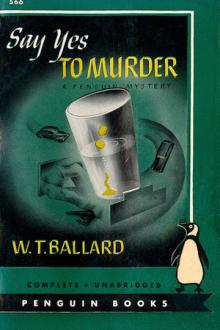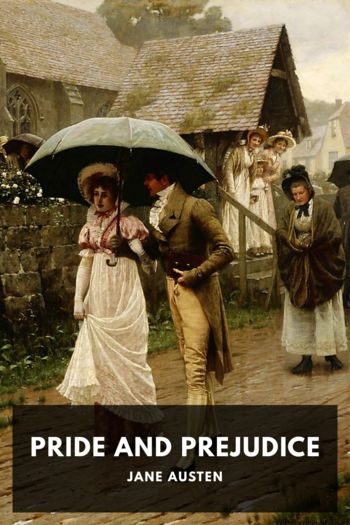Say Yes to Murder by Todhunter Ballard (pride and prejudice read .TXT) 📕

- Author: Todhunter Ballard
- Performer: -
Book online «Say Yes to Murder by Todhunter Ballard (pride and prejudice read .TXT) 📕». Author Todhunter Ballard
Say Yes To Murder
W.T. Ballard
William Lennox had a hangover. It was a mild hangover, brought on as much by lack of sleep as by an excess of alcohol. He had been tight the night before, but not, he thought, too tight. That was the trouble. If he could once get too tight, he might get sufficient sleep. Looking back on the five years of his Hollywood sojourn he thought that he had not had enough sleep in the entire period.
People seldom live their lives as they plan. Lennox had certainly not followed a pattern of his choosing. He had wanted an education enough to work his way through Northwestern, and at the time he had hoped for a teaching position.
Not that he had wanted to teach, but in the small town from which he came the teacher represented the highest in educational achievement. He had no clear picture of his life, no pattern to direct his steps.
His meeting with the editor of Chicago’s greatest daily was accidental. At first he was a little puzzled and appalled at the workings of the police system and of the criminal courts. To put it in his own words, he was green as hell.
But he was a good reporter, once he learned that no one is entitled to any privacy and overcame a natural objection to obtrusion into others’ affairs. He brought to his work a natural sense for news, imagination far above the average, and an utter lack of personal consideration.
He wanted now to write, to see his name upon the cover of a book, but once again an accident of fate altered radically the basic pattern of his life. His paper gave a beauty contest, a circulation-building gag.
Because of poor management, it had almost failed, and at the last minute it was dumped in Lennox’ lap. He discovered suddenly an unknown talent. He was a showman, born. He loved the contest and the girls. In short, he made it a success and for his work was offered a place in Hollywood’s leading publicity office.
Lennox had never had to ask for a job in his life, so he was not surprised when General Studios sent for him. He had submitted a story idea there, weeks before. But he was surprised when he was ushered into Sol Spurck’s massive office, for Spurck was the production chief of the sprawling studio.
They had never met, but Lennox had seen pictures of the producer, smiling benignly out from the smudged pages of many newspapers. He said, “About that story?”
Spurck looked blank. “Story?”
“Why, yes,” Lennox was puzzled. “Didn’t you send for me to talk about the story?”
“Story,” said Spurck, “I know nothing about it, you understand. It is you which I have been watching for a year. Your work, it is O.K. With a little training, we can use you.”
“As a writer?” Lennox was still too surprised to think clearly.
“Writers,” Spurck told him, “are a dime a dozen. What I need is a man with sense who doesn’t think too much. A job I’m offering. The writing we will talk about later.”
That was three years ago. The writing they had not talked about, and Lennox’ mouth was bitter as he turned into the main studio gate.
A car came up behind him, its white-walled tires making an expensive sound on the damp concrete. He stepped aside and had a momentary view of the occupant as the car passed him.
The morning sun was warm on her sleek black hair. He knew that she was very beautiful, but she did not turn her head to see him standing there.
Spurck was at his desk, a short figure dwarfed by the massive mahogany furniture which filled the place. His moonlike, usually pleasant face was twisted into a scowl as he looked up. “Where have you been?”
“Sleeping,” said Lennox. “Trying to get the alcohol out of my system so that there will be room enough for the Scotch that I’ll have to put into me today.”
There was six feet of Lennox, and his shoulders and back muscles were powerful under the carefully tailored suit. He had the Hollywood habit of always needing a haircut, but he had never gone in for sport clothes during business hours. He might have been a thirty-year-old bank president or one of the New Deal’s wonder boys. His face, aside from the look of cynical boredom and the myriad wrinkles which were gradually forming at the corners of his eyes, was intelligent and might have been intellectual save for the narrow drooping lines at the corners of his mouth.
“You drink too much,” said Spurck.
“And gamble too much, and see too many women. You have to do something. There’s too much strain in this business.”
“Look at me,” said Spurck. “Am I excited, I ask you? The answer of course is no. Mama I have at home which is my safety valve. A wife you need, a home, with children.”
Lennox thought of the women he had known. “Not children, Sol. Why propagate the race? We have enough fools in the world now.”
“You try,” said Spurck shrewdly, “to be hard. Honest, Bill. Hard is one thing which you can’t be. You couldn’t do no dirt to anyone. You can’t even say no.”
Lennox’ smile was bitter. “O.K., I can’t say no. I stay here when my heart’s a million miles away. But you didn’t get me out of bed to tell me this. Something’s happened or you wouldn’t have sent out that call. What’s the matter now?”
Spurck’s manner changed. He ceased to be a human being and became a businessman. “It’s Heyworth,” he said, drawing an enormous cigar from a big humidor and sticking it between his thick lips. “From the way he acts, you might even believe that his name was Shakespeare. This morning, he does not show up.”
Lennox was not excited. “You always have trouble with that ham. I warned you not to cast him in the Foster picture, but you wouldn’t listen. You told me that I was still jealous of Kitty and made some nasty cracks about my personal life.”
“Look,” said Spurck, “I am always the first to make a mistake, and then admit it, ain’t I? So I made a mistake, but now I’m asking that you find Heyworth. He’s drinking maybe. You find him, stay with him, you understand, until the picture is done, and don’t let him take one drink. That is all.”
2.
One of the things William Lennox did not have was an official title. He was Spurck’s watchdog, his unofficial eye. Through Lennox, Spurck managed to be in two places at the same time. It worked well and everyone was satisfied, everyone but Lennox. A thousand men would have loved to have his job, and not one of them could have held it for a week.
Excitement was all that kept him alive, and despite his constant grousing, he had to have it with him always or he would have died.
He crossed the reception room, past the rows of waiting hopeful people, and stepped out onto the sunlit lot, making his way directly toward the dressing rooms.
A maid, trim in black and white, answered his knock. Her eyes got uncertain when she saw who it was. “I don’t think…”
Kitty Foster’s face was heavy with cream as she peered out into the entry hall. “Who is it, Chart?” Then she saw Lennox and her eyes under the carefully plucked brows got cold and hostile. “Don’t let him in.”
Lennox came in. The maid blocked his progress, but he placed a hand under each of her elbows and lifted her neatly out of the way.
The actress glared at him for an instant, then retreated into the dressing room until she sank on the bench before the mirrored table. “What do you want?”
For an instant it seemed that he might strike her, but he was only reaching into his breast pocket for a cigarette. “Look, Kitty,” his tone had not softened. “I’m asking for the studio. You were with Heyworth last night, first at Ciro’s then at the Brown Derby in Beverly.”
She was on her feet. “I’ve had enough of this jealous spying. I’m going to Spurck. I complained once before. Remember?”
The remembrance brought a dull flush to Lennox’ face. “I’m not spying, you fool. The studio checked up, not I. Heyworth isn’t here. Price wants to shoot. You’re good, baby. Even I admit you are good, and I should know.
“You played me for a sucker for eight months, and anybody who can make it look attractive for that long is an actress. But the best actress in the business can’t make a love scene convincing if she has to play it alone. You need Heyworth, and we can’t find him.”
Her eyes widened, then narrowed, and the glitter came back into the dark pupils. “You mean that he isn’t home?”
Lennox shook his head. “He isn’t, unless his Filipino is lying. The studio has been calling the house since eight-thirty.”
She put the knuckle of her right index finger between her rouged lips and sucked on it thoughtfully. It made her look like a discontented child, but she was no child, and she was angry. Lennox stood there, trying to guess why she was furious.
In a minute she told him, told him in sharp sentences as if she were short of breath. “Jean Jeffries. She followed us to the Derby last night.”
William Lennox said, “Here! Here!” and frowned deeply. “That’s no way to talk.”
“I’ll talk any way that I damned please.” Kitty Foster’s spike heel tapped hard on the floor. “The Jeffries kid butted in on our table as if she owned the place, and Leon couldn’t do anything but offer her a lift home.”
Lennox laughed with sudden understanding. “And they took you home first.”
“You’re lousy, Bill Lennox.” She took a half-step forward as if to rake her long enameled nails down across his cheek.
“All right. He did take me home first and then he went on with her. I suppose that he’s still with her—stayed the night, no doubt. Maybe she recited Chaucer to him or one of those other old French poets that she’s always talking about, trying to show us all up because she’s been to Europe, was educated there.” Kitty dropped back onto the seat and buried her face in the crook of her arm. “Get out of here. Can’t you give a lady a chance to cry in peace?”
3.
Nancy Hobbs was waiting for him at their regular table in Mike Lyman’s. She was a brown girl with soft, warm hair tucked around the absurd little hat.
Looking at her, he thought what a difference there was in beauty. She was well-groomed, carefully turned out, but she did not look enameled, she looked like a lady. To him, she was his one remaining link with the life he had once known. As a green kid fresh from an eastern school, she had gone to work on his paper, and he had helped to break her in. Once they had eaten in the little restaurants which dot the Chicago Loop and planned the books that they would write. That seemed a long, long time ago.
She said: “You look tired and worried, Bill.”
He shrugged. “I was so





Comments (0)